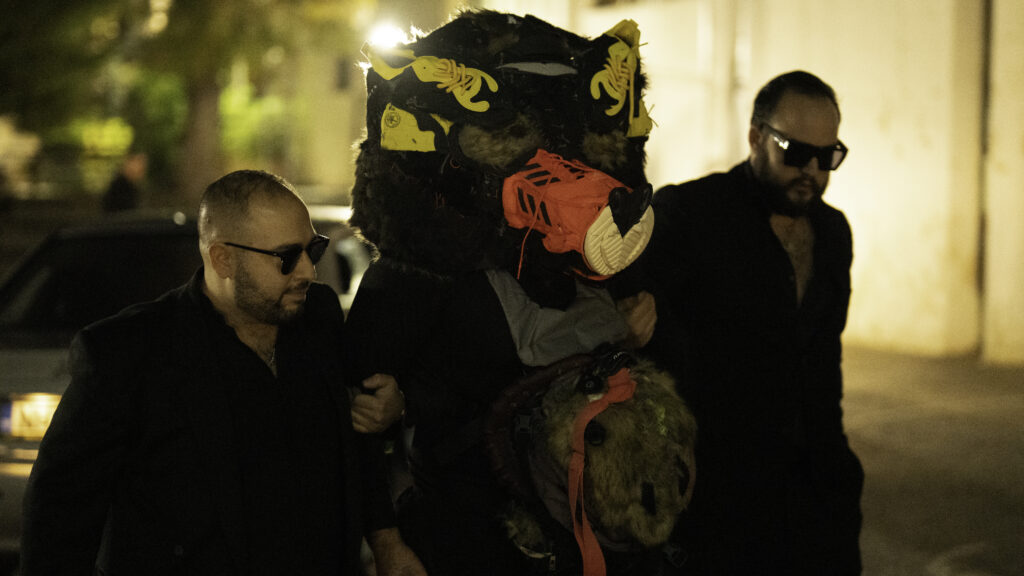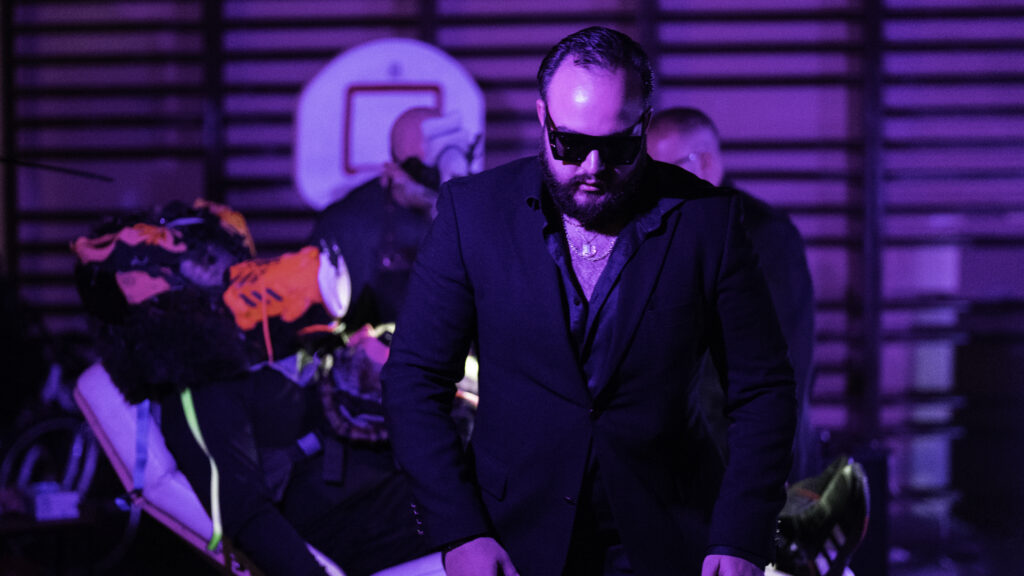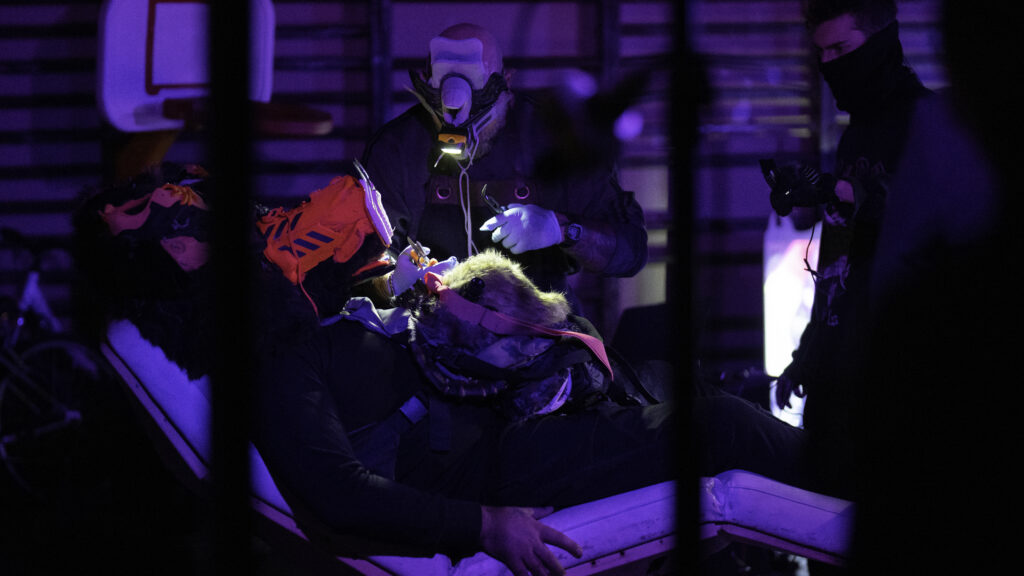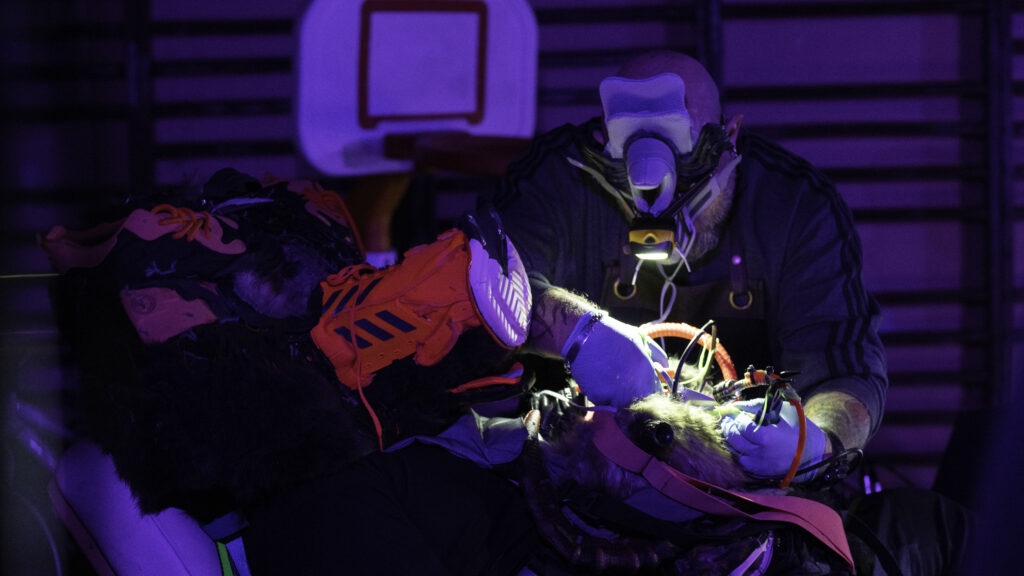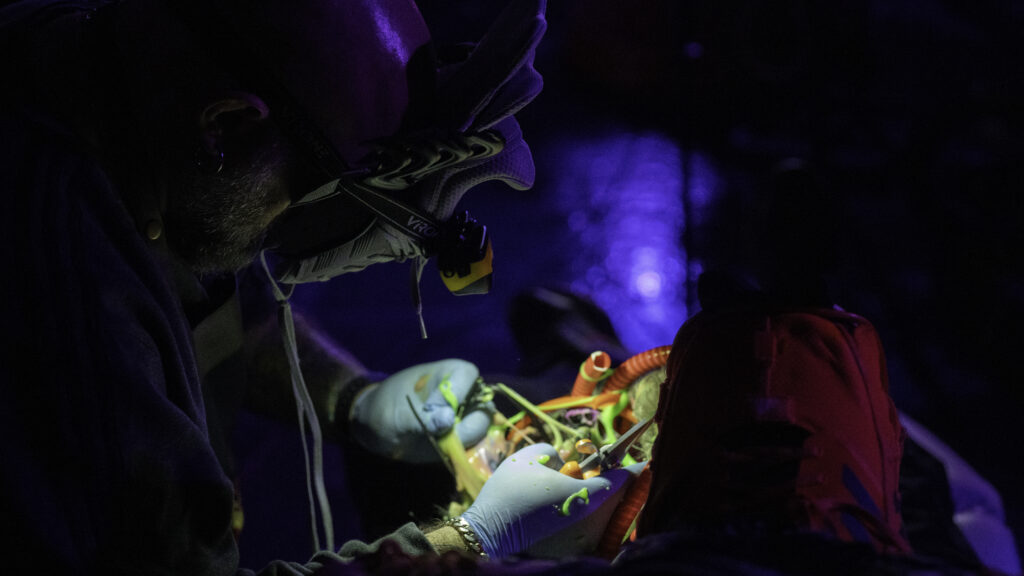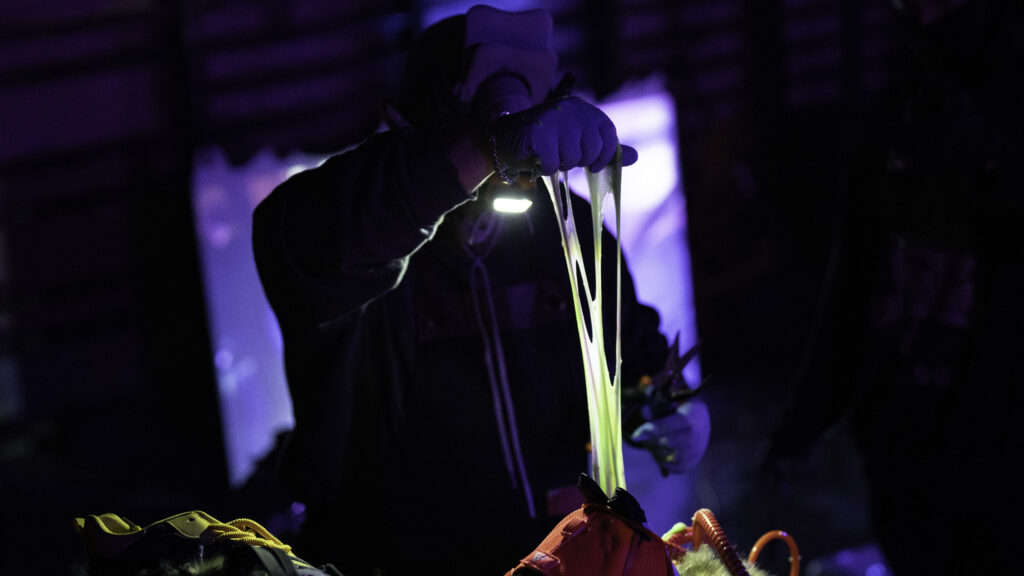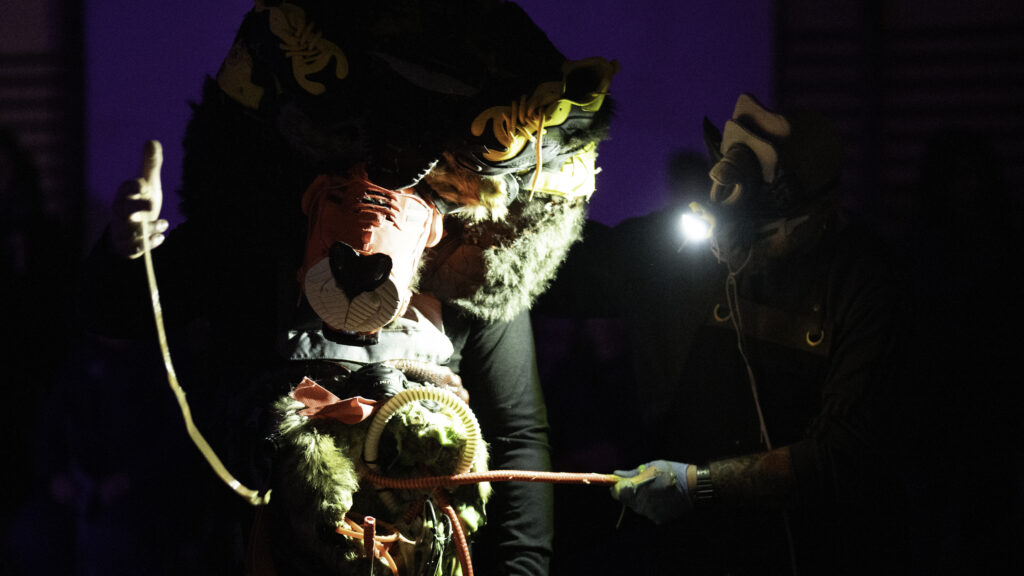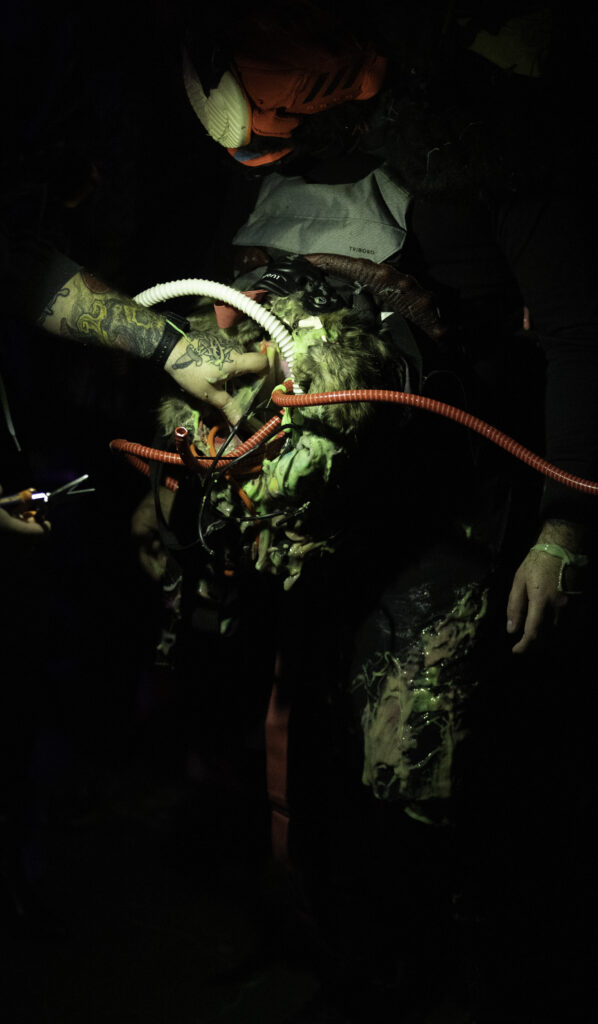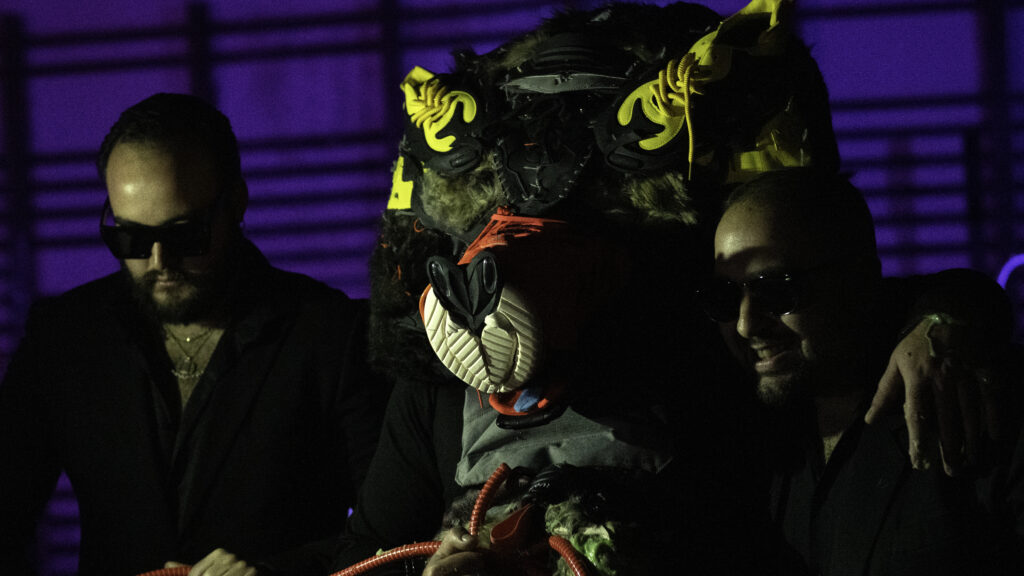
The Bear #3 by Kostis Stafylakis.
In his recent solo exhibitions, such as GZPRM GOPNIK (KEIV ATHENS, 2023) and On an island (K-Gold Temporary Gallery, 2024), the image of the Slavic/Russian gopnik dominates—wearing full-body adidas tracksuits, ushankas, dress shoes, and listening to early techno. Through online channels such as Squatting Slavs in Tracksuits, Look at this Russian, DJ Blyatman, etc., the image of the gopnik becomes solidified as a meme, algorithmically representing post-Soviet Russian everyday life as surreal, wild, paradoxical, and rough-edged.
As a result of this obsessive consumption of material from contemporary Russia, the algorithm “infected” the artist’s timeline, flooding it with reels showing bears cooperating with Russians: a bear helping Russians with their workouts, an influencer posing while hugging bears, someone feeding a bear with a fork.
In The Bear #3, Stafylakis performs his third operation on such an algorithmic bear to reveal the inside of the bear’s guts.
Bear: Vassilis Bacalis
Driver: Stathis Papadopoulos
Bear’s Escort: Christos Katsinis
Video Editing: Eva Koutsoupaki
Multimedia: Chris Solomos
Regarding the Do Electric Sheep Dream? Exhibition:
CURATOR: DIMITRIS TRIKAS
ORGANIZATION: “ROOTS OF CULTURE” AMKE
November 21, 2024 – December 22, 2024
➔ Opening Events:
📌 November 21
📍Old Chemistry Building, Stai Mansion & Grypareio Mansion
📌 November 22
📍Marasleio Teaching School
The visual arts exhibition “Do Electric Sheep Dream? The Human Condition in the Age of Artificial Intelligence” presents works by 55 artists and artist collectives, accompanied by a dynamic public program that includes performances, musical events, and roundtable discussions with around 50 speakers.
Starting from the visionary ideas of Hannah Arendt and Philip K. Dick, the exhibition explores the complex relationship between Artificial Intelligence (AI) and Democracy—and vice versa—posing critical questions about the future of humanity in a world increasingly shaped by algorithms and digital technologies.
Hannah Arendt’s thought is permeated by reflections and critical perspectives on humanity’s capacity to begin something new. In her seminal philosophical work, The Human Condition (1958), she introduces the term vita activa to describe the “three fundamental human activities: labor, work, and action,” which are pivotal “because they correspond to the basic conditions under which life on Earth has been given to humans.”
A decade later, Philip K. Dick writes the kaleidoscopic novel Do Androids Dream of Electric Sheep?, which inspired Ridley Scott’s iconic film Blade Runner. Dick places his story and characters on a decimated Earth, filled with debris and radioactive dust, where humans, overwhelmed by suffering and destruction, migrate to another planet under a governmental promise of an android companion so advanced that only a complex empathy test can distinguish it from a real human. Dick’s vision is imbued with reflections on humankind’s ability to destroy their planet and civilization, while androids assume not only the “three fundamental human activities” (in Arendt’s terms) but many more.
Through their artworks and participation in the public program, artists and scholars delve into issues of democracy, justice and law, human rights, surveillance, refugees, labor, leisure, art and creativity, education, and even the possibility of intervening in life-and-death decisions in the age of Artificial Intelligence. Here, “Democracy” operates as a comprehensive framework for the challenges facing contemporary societies, serving both as a field of inspiration and critical inquiry through which the moral and political implications of the widespread implementation of AI are examined.
The exhibition will unfold across four locations in central Athens: the Old Chemistry Building, Marasleio Teaching School, the Stai Mansion, and the Grypareio Mansion. It is important to highlight that both the Old Chemistry Building—with the Law School Library—and the Marasleio Teaching School, a historic and symbolic building that once functioned as a cradle of educational reform and democracy, are considered ideal venues for the development of the exhibition “Do Electric Sheep Dream? The Human Condition in the Age of Artificial Intelligence.”
This project is held under the auspices and with the financial support of the Ministry of Culture, the Municipality of Athens, the Organization of Culture, Sports, and Youth of the Municipality of Athens (OPANDA), and the Cultural Foundation of ESIEA, as well as under the auspices of the Law School of the National and Kapodistrian University of Athens (NKUA), in close collaboration with the School of Education and other departments of NKUA.
❗️Participating Artists❗️
Dimitris Alithinos, Katerina Apostolidou, Fani Arapi, Antonis Vasilakis, Philippos Vasileiou, Babis Venetopoulos, Haris Vlachos, Natalia Geraki, Evangelia Danadaki, DiMiiTriii, Nefeli Dimitriadi, Giorgos Divaris, Giorgos Drivas, Giorgos Drosos, Theodoros Zafeiropoulos, Lida Zacharopoulou, Hector Theoulakis, Nikos Kanarelis, Apostolos Karakatsanis, Christoforos Katsadiotis, Dimitris Kontodimos, Lefteris Kontopodis, Danai Kotsaki, Alex Louloudis, Manousos Manousakis, Maria Mavropoulou, Eleni Mesadou, Christina Mitrense, Yiannis Mitrou, Vasilis Bakalis, Fani Bountouroglou, Nourako, Gioula and Olga Papadopoulou, Giorgos Papafigos, Eleftheria Profitilioti, Manthos Santorinaios, Yiannis Skourletis, Nikos Stathopoulos, Marios Stamatis, Kostis Stafylakis, Danai Stratou, Athanasia Tsatsou, Giorgos Tserionis, Philippos Tsitsopoulos, Athanasia Tsopanargia, Panos Famelis, Marios Fournaris, Panos Charalambous, Yiannis Christakos, Kostas Christopoulos, Vasilis Psarras, Collective Continuum (Dionysis Zamblaras, Nefeli Georgakopoulou, Sofia Kourkoulakou), Ingo Dunnebier, Kildi Drasa, Shekine Naidi, Department of Film, Aristotle University of Thessaloniki (AUTH) (Akis Afentoulidis, Dimitris Vafeiadis, Marios Leokratis, Deucalion Nikolaos Papadopoulos, Damianos Papatsikourakis, Natasa Hasakioli)
